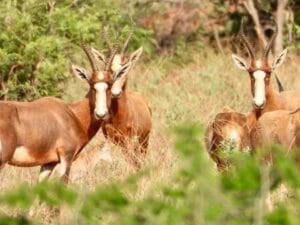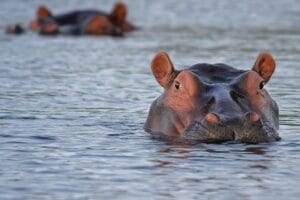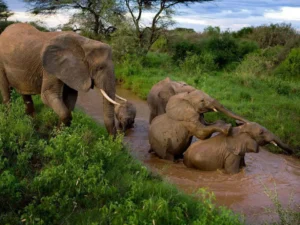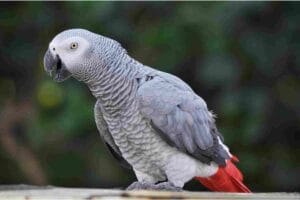Driving along the Akosombo-Tema main road toward the Adomi Bridge, you’ll see baboons roaming the streets, eager to say hello to passing motorists. The Shai Hills Resource Reserve is close by, and these baboons often stray onto the main road in search of food, without a care in the world. If you live in an area with lush greenery, you’ll likely wake up to the heavenly chirping of Ghana’s diverse bird species. Or maybe you’ve chosen to visit one of the country’s amazing parks to watch zebras and lions showcase their majesty. Whatever you choose, wildlife in Ghana is rich and will surely fill you with irie satisfaction.
For many, when they hear of Africa, they think of abundant wildlife teeming with the glory of the earth. If you are one of these people, you’re not wrong. Wildlife in Africa is rich and filled with grandeur and splendor. Ghana is no different. It is home to some of the most diverse and wonderfully captivating wildlife in West Africa. Its dense rainforests and sprawling savannas support an incredible array of plant and animal species.
Whether you’re like me, a nature lover, or an urban fanatic—Ghana’s wildlife offers a unique experience for everyone. In this blog, we’ll unlock the breathtaking wildlife in Ghana and find out why exploring the country’s wildlife should be on every nature lover’s bucket list. If you’re looking for experiences that will immerse you in nature’s wonders, then come with me and let’s explore Ghana’s wildlife together!
The Diverse Ecosystems of Ghana
While doing my Degree in Environmental Science, I particularly loved the definition of biodiversity. I learnt that it is the variety and variability among living organisms and the ecological complexes in which they occur. Yet, what I have found is that my lecturer missed the mark. The true definition of biodiversity is Ghana.
Ghana’s lush landscapes are as varied as its wildlife. The country boasts coastal wetlands, tropical rainforests, and dry savannas that all play a critical role in supporting different species. Its biodiversity lives up to its definition, diverse and varied.
Driving along the coastal regions, you’ll discover mangroves and lagoons that attract migratory birds. In its inlands, rainforests shelter rare mammals, reptiles, and amphibians while in northern regions of Ghana you’ll see vast savannas that provide a home to large mammals like elephants and antelopes.
Wildlife in Ghana’s National Parks and Reserves
Ghana has several national parks and wildlife reserves dedicated to protecting its rich biodiversity. These parks preserve the country’s natural environment, making it a haven for eco-tourism. As you tour these amazing parks, you’ll begin to understand more about wildlife in Ghana, and also start to appreciate the country’s efforts to preserve them. Let’s look at the types of wildlife found in the various parks.
1. Mole National Park – A Haven for Wildlife





Mole National Park, located in the northern region, is Ghana’s largest and most famous wildlife sanctuary. The park is home to a variety of animals, including elephants, buffaloes, baboons, warthogs, and over 300 bird species. If you are into getting close and personal with Ghana’s wildlife, you’ll love the opportunity Mole National Park offers. Unlike other African safaris, Mole offers a rare opportunity for walking safaris, allowing visitors to get up close to these majestic creatures in their natural habitat.
2. Kakum National Park – The Rainforest Experience



If you are into bird watching then the Kakum National Park is for you. It’s a birdwatcher’s favourite, tucked in the confines of the Central Region. Kakum National Park is famous for its lush rainforest and breathtaking canopy walkway. The park protects endangered species such as the forest elephant, bongo antelope, and Diana monkey. Bird watchers will be delighted by the presence of rare species like the white-breasted guinea fowl and the African grey parrot.
3. Ankasa Conservation Area – Ghana’s Most Pristine Forest
For those seeking an untouched rainforest experience, Ankasa Conservation Area in the Western Region is the perfect destination. This park is home to leopards, forest elephants, and an array of amphibians and reptiles. The park’s rich biodiversity makes it a key site for conservation efforts in Ghana. Wildlife in Ghana wouldn’t be completed without the Ankasa Conservation Area.
4. Bui National Park – The Land of Hippos




Bui National Park, located along the Black Volta River, is best known for its hippo population. The river serves as a critical habitat for these massive mammals, and visitors can take boat tours to observe them in their natural environment. The park also hosts antelopes, baboons, and crocodiles making it a prime destination for those looking to explore wildlife in Ghana.
5. Digya National Park – Ghana’s Oldest National Park


If you are old school, then the Digya National Park is for you. Situated near Lake Volta, Digya National Park is Ghana’s oldest national park. It is home to a variety of animals, including elephants, manatees, and various primate species. Though less visited than Mole or Kakum, Digya offers an off-the-beaten-path adventure for wildlife lovers.
Vulnerable and Endangered Species : Conservation Efforts




Despite the beauty of wildlife in Ghana, many species face threats from habitat loss, poaching, and climate change. However, conservation organizations and the Ghana Wildlife Division are actively working to protect these species and restore affected ecosystems. Their presence help to protect wildlife in Ghana, enduring future generations get to experience like us, the beautiful natural environment of Ghana. Some of the most notable conservation efforts that have been put in place to protect vulnerable species include:
Community-based conservation programs – Local communities are engaged in wildlife protection, ensuring that conservation efforts are sustainable.
Anti-poaching initiatives – Authorities are cracking down on illegal hunting and trade in wildlife.
Reforestation efforts – Deforestation is a major threat to Ghana’s rainforests, and various initiatives are in place to restore lost habitats.
Education and awareness campaigns – Schools and communities are educated on the importance of protecting Ghana’s wildlife.
Some Examples of Vulnerable and Endangered Species
- Forest Elephant (Loxodonta cyclotis)
- West African Chimpanzee (Pan troglodytes verus)
- Leopard (Panthera pardus)
- White-bellied Pangolin (Phataginus tricuspis)
- Dwarf Crocodile (Osteolaemus tetraspis)
Birdwatching is A Part Of Wildlife in Ghana



Ghana is a dream destination for birdwatchers, with over 750 bird species recorded. The country’s varied ecosystems provide perfect habitats for different types of birds, from water-loving species in the coastal regions to forest dwellers in Kakum. Some of the most notable birds include:
Yellow-headed Picathartes (a rare and sought-after species)
White-necked Rockfowl
African Grey Parrot
Egyptian Plover
Violet Turaco
Birdwatching hotspots include Kakum National Park, Ankasa Forest, and the coastal wetlands near Ada Foah. If you plan to explore wildlife in Ghana, visit one of these parks and gaze as these heavenly creatures stretch their wings across the skies, floating on the wind.
Ecotourism and the Role of Wildlife in Ghana’s Economy
Wildlife in Ghana is very important to both the environment and the economy. They beauty attract thousands of eco-tourists every year. Ecotourism contributes significantly to the local economy by creating jobs, promoting sustainable development, and encouraging conservation. Many tour operators now offer ethical wildlife tours that emphasize conservation while providing visitors with unforgettable experiences.
In terms of environmental importance, each species of Ghanaian wildlife is important to maintain a balance in the environment. For example, the African Forest Elephant plays a crucial role in seed dispersal, helping to regenerate forests. By feeding on fruits and spreading seeds through their dung, they support the growth of diverse plant species, which in turn sustains other wildlife and maintains the health of Ghana’s forests.
The Future of Wildlife in Ghana
The future of Ghana’s wildlife depends on continued conservation efforts and sustainable tourism. As more people become aware of the importance of protecting nature, there is hope for the survival of Ghana’s rich biodiversity. Government policies, community participation, and international support will play a vital role in ensuring that future generations can experience the wonders of Ghana’s wildlife.
Why You Should Visit Ghana for a Wildlife Experience
If you love nature and wildlife, Ghana is an incredible destination. With its diverse ecosystems, unique animal species, and breathtaking landscapes, the country offers a wildlife experience unlike any other. Whether you are roaming through rainforest floors, spotting elephants on a walking safari, or marveling at rare bird species, Ghana will leave you with memories to cherish forever. Visiting and experiencing wildlife in Ghana will only add to your collage of special moments.
Final Thoughts
Wildlife in Ghana is an example of the rich natural resources of this West African haven. It is a witness to the country’s natural wealth and biodiversity that sets it apart. Despite the challenges posed by deforestation, poaching, and climate change, conservation efforts are making a difference. By supporting ecotourism and sustainable practices, we can ensure that Ghana’s wildlife thrives for generations to come.
So, if you’re looking for an unforgettable wildlife adventure, Ghana is waiting for you!











